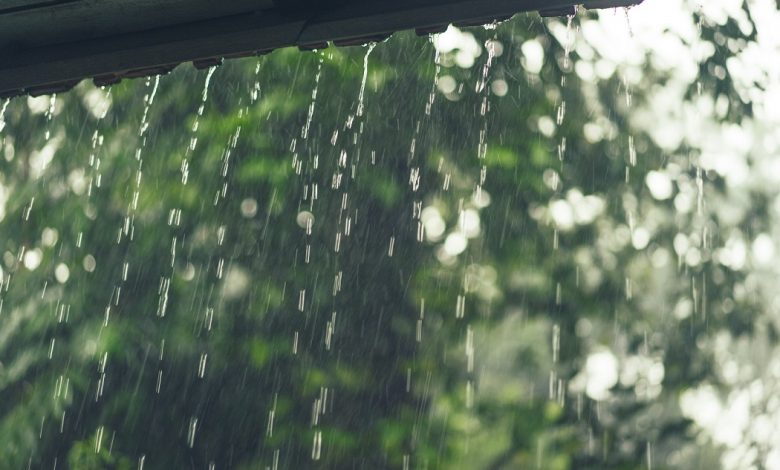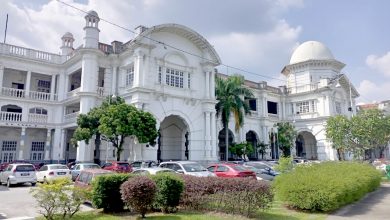

By Joachim Ng
In the middle of choppy weather, elderly parliamentarians found it more engaging to stir up a tempest of stormy words over — believe it or not — a pair of chopsticks. Break them as you can dig into the mee rebus with your fingers. But, any way you eat, just make sure it is climate-friendly.
Chopsticks, unless they are the disposable type, need to be washed after use. Wasting water. Eating with fingers requires washing before and after meals. That’s doubly wasteful. The Japanese are more environmentally conscious as they drink soup by holding the bowl. But the animals are the best; they just eat directly with their mouth. No finger-licking good stuff, and no need for washing.
With the recent heavy nationwide flooding, parliamentarians should focus their minds on water instead of drowning themselves in cultural sophistry. The entire country has experienced continuous rainfall with the amount of rain on one particular day exceeding the average rainfall for a month. This only occurs once every 100 years, according to the Environment and Water Ministry.
Other countries that suffered the deluge last year had also thought this was a one in 100-year weather event. But they drowned again this year. If you haven’t read the news about climate change, this is the time to put down your chopsticks and keep your fingers off the plate.
On December 18, the water level in Perak and five other states hit Danger point. You may think there is at least one silver lining in the dark cloud: a copious flow of tap water from now on. Wrong. In Selangor and Negeri Sembilan, continuous rain causing floods, power outages, landslides, and water turbidity affected several water treatment plants, resulting in tap supply disruptions to hundreds of areas.
Did we have a national crisis battle plan to minimise damage? No, and this was despite the fact that devastating rains had already hit Perak and Kedah Since August, with 149 people having to evacuate their homes in Perak and 86 houses destroyed in Kedah. Kampungs and housing estates along Sungai Siput and Sungai Pari were flooded.
The big surprise awaiting Malaysians is that we are likely to experience a drought following the deluge as alternating modes of weather — not stretched over a hundred years but all in ten years. This is the quickening pace of climate change as scientists have noticed that the effects are now rising exponentially.
Sitting on the rooftops of their flooded homes and seeing water everywhere, Malaysians may have forgotten that the first five months of 2019 were scorchingly hot and dry. Hulu Perak did not see any rain for two months, and padi farmers in the northern states were badly affected by the drought.
The situation got worse in the early months of 2020 with vast tracts of padi land baking in the sun. Farmers remembered that such punishing drought conditions stretched back only a recent 10 years.
Deluge and drought are visiting Malaysia like a pair of twins, one following the other. In July this year, the deluge visited China and Europe, prompting Dutch Premier Mark Rutte to declare that it was “without doubt” the result of climate change. In the same month, the drought visited America, West Asia, and North Africa with record-breaking searing heat.
In August 2021, a family in Sungai Petani had to climb up to the attic to save themselves from the “tsunami waters” entering the house. This was their first climate change experience in the 15 years that they had been staying there. But as early as 2019, Indonesia and the Philippines had already felt the climate change blow, and “nowhere is safe” became a thematic cry.
In August, the United Nations had described the worsening global situation as a code red for humanity. Yet there was no mention of climate change in the Melaka and Sarawak state elections, although both states would shortly be hit by torrential rains. For that matter, has anyone in the Dewan Rakyat proposed a method to handle both the deluge and the drought as two sides of climate change, like a coin? No.
You as a climate victim must demand that MPs stop wasting time politicking over race and religion, whiskey and chopsticks. The Dewan Rakyat must, as soon as possible, legislate for a nationwide district storm water catchment system to capture rainwater in every district and store it for use in dry times. Simultaneously, storm water catchment will minimise flooding by channelling the excess rainfall into huge storage tanks.
A district storm water catchment system will have a series of linked components beginning with pipes installed at lawns, parking areas, terraces, roadsides, any piece of open ground, and the roof edges of community-owned and government-owned buildings in a district. These pipes, with inlet holes covered by coarse mesh to prevent the passage of debris, funnel storm water into sand-gravel filters to eliminate dirt.
The filtered water then goes into covered storage tanks that can even be underground for security. Each tank must be sufficiently large to store enough water to fill up a swimming pool. This will reduce flooding in populated areas. The stored water is then pumped to a treatment plant serving a few adjoining districts. Water treatment plants should be built in every populated district to decentralise this facility as the best way to avoid dry taps.
How much will a nationwide district storm water catchment system cost? That is the wrong question to ask. The right question is: how much damage can it avert? If you total up the cost of damage to buildings, furnishing, equipment, transport vehicles, amenities, businesses, and the loss of lives over ten deluges, you can figure out that a nationwide district storm water catchment system is very much cheaper.
And the system comes into great use when drought strikes by ensuring that the tap keeps flowing for homes and businesses, and there is sufficient water for irrigation of farmlands. The shutdown of factories and loss of farm produce through lack of water in a drought causes great economic damage. Land cost of a storm water catchment system is zero if storage tanks are built underground in school playing fields and community playgrounds.
What does it take to get things moving? First, the nation has to move away from its suicidal obsession with racial, religious, and cultural identities. Only then can Malaysians focus on developing a global human identity so crucial for a sense of planetary stewardship driven by a global vision of planetary well-being.
Disclaimer: The views and opinions expressed in this article are those of the author and do not reflect the official policy or position of Ipoh Echo.


